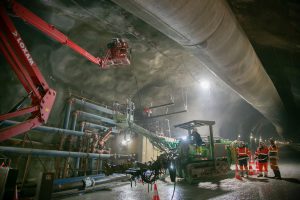 TELT, the Franco-Italian company delivering the Lyon-Turin railway link awarded three major contracts totalling EUR 3 billion for the construction of the 48-km of Lyon-Turin base tunnel. The contracts are co-financed by Europe, Italy and France. Three consortia comprising thirteen international companies will build 80% of the base tunnel along the railway line.
TELT, the Franco-Italian company delivering the Lyon-Turin railway link awarded three major contracts totalling EUR 3 billion for the construction of the 48-km of Lyon-Turin base tunnel. The contracts are co-financed by Europe, Italy and France. Three consortia comprising thirteen international companies will build 80% of the base tunnel along the railway line.
The contracts covering three lots were assigned to:
Lot 1: Eiffage Génie Civil (leader) / Spie Batignolles / Ghella / Cogeis consortium was awarded a EUR 1.47 billion contract. It will build 22 km stretch of the tunnel between the existing Villarodin-Bourget/Modane tunnel and Italy. The tunnels will be excavated in approximately 72 months. Towards Turin it will be used two tunnel boring machines and the tunnel towards Lyon will be created using traditional method (hydraulic breaker and/or explosive). The Modane safety site, the communication branches located every 333 metres between the two tunnels, necessary for maintenance and safety, and all the niches and transverse tunnels for operation and safety, will also be realised in this phase. The territories of the municipalities of Villarodin-Bourget, Modane, Avrieux and Aussois will be those involved.
Lot 2: Vinci Construction Grands Projets (leader) / Dodin Campenon Bernard / Vinci Construction France TP Lyon / WeBuild consortium won a EUR 1.43 billion contract under which the construction works are expected to be completed within 65 months. The constructor will continue the works along the 10-km-long section, already completed at Saint-Martin-la-Porte, towards Italy. All 23 km of the twin-tube between Saint-Martin-la-Porte, La Praz and Modane will be excavated. The work will be carried out using three TBMs, while the more geologically complex sections will be excavated using traditional methods (hydraulic breaker and/or explosives). The territories of the municipalities of Saint-Martin-la-Porte, Saint-Michel-de-Maurienne, Orelle, Saint André, Villargondran and Saint-Julien-Mont-Denis will be involved. The La Praz safety site, communication branches every 333 metres between tunnels, technical rooms, niches and tunnels for operation and safety will also to be built in this lot.
Lot 3: Implenia Suisse (leader) / Implenia France / NGE / Itinera / Rizzani de Eccher consortium was awarded a EUR 228 million contract which is expected to be completed within 70 months. The consortium will be responsible for the tunnel between the French entrance portal at Saint-Julien-Montdenis and Saint-Martin-la-Porte. Excavation in this section will be carried out using the traditional method, that is, with a hydraulic breaker and/or explosives.
There are also works planned on the Villard-Clément platform between the artificial tunnel to the west, the cut and cover tunnel is already built, and the natural entrance of the tunnel into the mountain to the east. In addition, there will be communication branches every 333 metres between the two tunnels, technical rooms and niches for operation and safety.
The tunnel will be created using five tunnel boring machines. In the coming months, the Italian lot, worth approximately EUR 1 billion, will see the excavation of the tunnel that will emerge at Susa (Turin). The Lyon-Turin base tunnel under the Alps between France and Italy will be one of the longest in the world. It will be 57.5 km-long in two separate tubes, to keep separate the flow of trains in both directions and ensure complete safety, for a total of 115 km of tunnels.
To date, a total of 30 km of tunnels have been excavated. This represents more than 18% of the total 162 km planned for the project. This complex project comprises two parallel tunnels, four access adits and 204 safety bypasses. 113 km of exploratory surveys and core drilling in Italy and France have also been carried out.
The Lyon-Turin railway line represents the primary section of the Mediterranean Corridor and will make it possible to cross the Alps at a speed of 220 km/h for passengers and 120 km/h for freight.
Share on:



